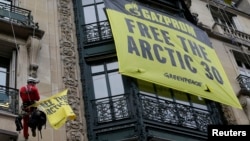Russian investigators say they are considering additional charges against several of the 30 Greenpeace activists arrested after a protest at an Arctic offshore oil drilling platform.
A spokesman with Moscow's Investigative Committee said Wednesday that authorities found narcotics and "dual-use equipment'' on the Greenpeace ship, Arctic Sunrise.
In a statement, Greenpeace International said that it assumes Russian authorities are referring to the medical supplies its ships are required to carry under maritime law, adding that any claim of illegal drugs is "a fabrication."
Last week, Russia charged the 28 activists and two journalists on board the Dutch-registered vessel with piracy. They face up to 15 years in jail if convicted of piracy.
The Arctic Sunrise was seized on September 18 after it approached Russia’s only offshore oil production platform in the Arctic and activists tried to scale it.
On Wednesday, a Russian court rejected bail requests for three of the activists. Greenpeace International executive director Kumi Naidoo said he wrote to Russian President Vladimir Putin offering himself as a stand-in, in exchange for their release on bail.
"Given that our activists have been denied the bail yet again today, I have written to President Putin seeking an urgent meeting with him and offering to come to Russia and offering myself as a guarantor in exchange for the release on bail of the activists and to stay in Russia for as long as the trial takes. I recognize that there is risk in this given that I had participated in exactly the same action last year. However, given the urgency that the United Nations has just called on us to act on climate change and the fact that we are running out of time this is a risk that we are prepared to take," said Naidoo.
Putin has said it is "obvious" the Greenpeace activists are not pirates, but defended the seizure of their ship, saying the activists tried to capture the oil platform.
A spokesman with Moscow's Investigative Committee said Wednesday that authorities found narcotics and "dual-use equipment'' on the Greenpeace ship, Arctic Sunrise.
In a statement, Greenpeace International said that it assumes Russian authorities are referring to the medical supplies its ships are required to carry under maritime law, adding that any claim of illegal drugs is "a fabrication."
Last week, Russia charged the 28 activists and two journalists on board the Dutch-registered vessel with piracy. They face up to 15 years in jail if convicted of piracy.
The Arctic Sunrise was seized on September 18 after it approached Russia’s only offshore oil production platform in the Arctic and activists tried to scale it.
On Wednesday, a Russian court rejected bail requests for three of the activists. Greenpeace International executive director Kumi Naidoo said he wrote to Russian President Vladimir Putin offering himself as a stand-in, in exchange for their release on bail.
"Given that our activists have been denied the bail yet again today, I have written to President Putin seeking an urgent meeting with him and offering to come to Russia and offering myself as a guarantor in exchange for the release on bail of the activists and to stay in Russia for as long as the trial takes. I recognize that there is risk in this given that I had participated in exactly the same action last year. However, given the urgency that the United Nations has just called on us to act on climate change and the fact that we are running out of time this is a risk that we are prepared to take," said Naidoo.
Putin has said it is "obvious" the Greenpeace activists are not pirates, but defended the seizure of their ship, saying the activists tried to capture the oil platform.





